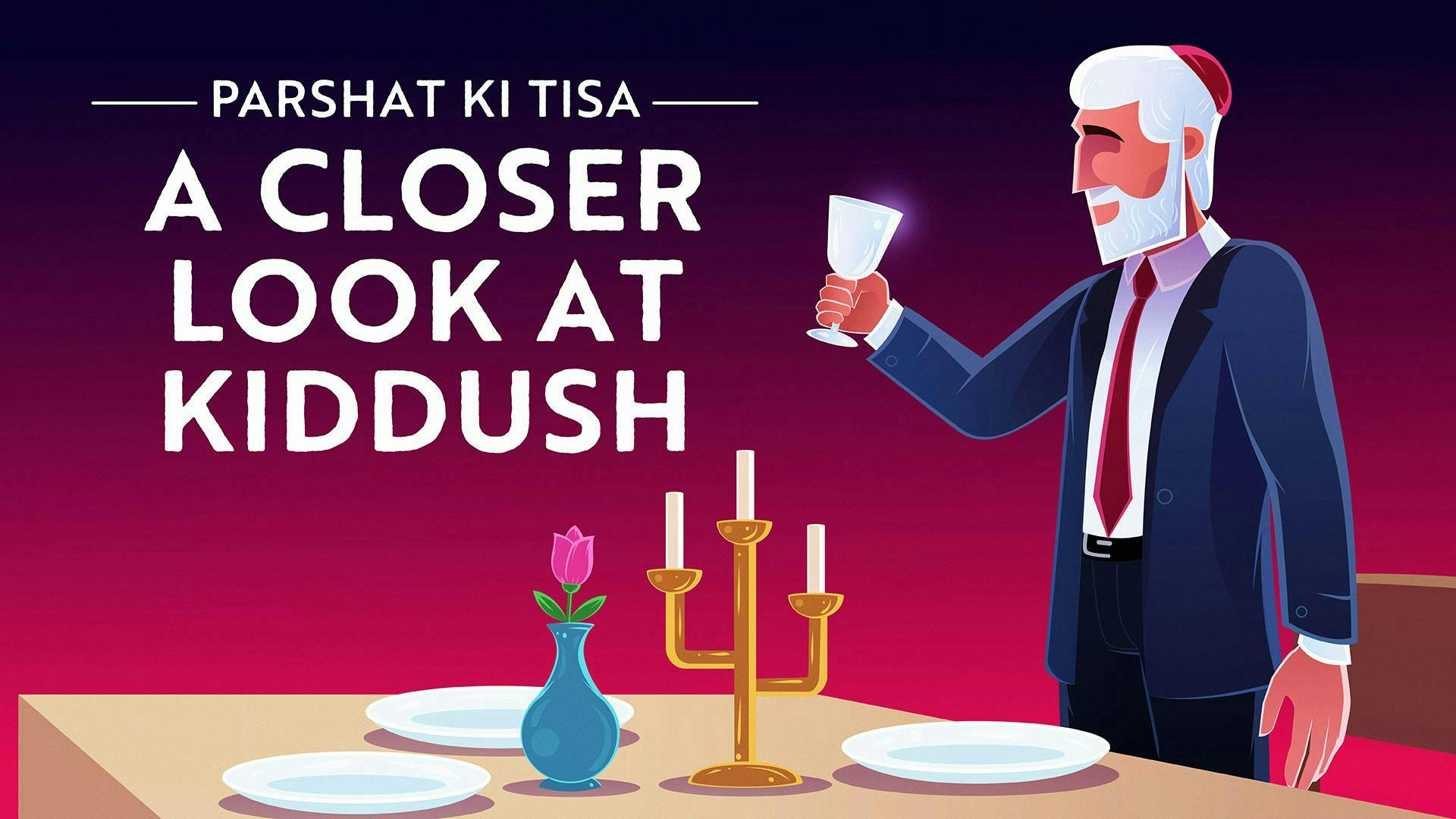The Deeper Meaning of Shabbat Morning Kiddush
Unpacking the Shabbat Covenant
By Ari Levisohn | 15 February 2024 | 5 Minute Read
Shabbat Morning Kiddush Explained
You may be familiar with the kiddush we say every Shabbat morning (or afternoon). You may even have a tune for it. I’ll be honest. When I recite kiddush, I am usually just focused on the food that comes afterwards. But have you ever slowed down to think about what it means?
Text of Kiddush
The main texts of Shabbat morning Kiddush come from two sections in Exodus. The first, from Exodus 31, talks about the covenant of Shabbat, and the second, from Exodus 20 is the description of Shabbat from the Ten Commandments.
Exodus 31:16-17
וְשָׁמְרוּ בְנֵי־יִשְׂרָאֵל אֶת־הַשַּׁבָּת לַעֲשׂוֹת אֶת־הַשַּׁבָּת לְדֹרֹתָם בְּרִית עוֹלָם. בֵּינִי וּבֵין בְּנֵי יִשְׂרָאֵל אוֹת הִוא לְעֹלָם כִּי־שֵׁשֶׁת יָמִים עָשָׂה יְהֹוָה אֶת־הַשָּׁמַיִם וְאֶת־הָאָרֶץ וּבַיּוֹם הַשְּׁבִיעִי שָׁבַת וַיִּנָּפַשׁ.
The Israelite people shall keep the sabbath, observing the sabbath throughout the ages as a covenant for all time. It shall be a sign for all time between Me and the people of Israel. For in six days יהוה made heaven and earth, and on the seventh day [God] ceased from work and was refreshed.
Exodus 20:8-11
זָכוֹר אֶת־יוֹם הַשַּׁבָּת לְקַדְּשׁוֹ. שֵׁשֶׁת יָמִים תַּעֲבֹד וְעָשִׂיתָ כָּל־מְלַאכְתֶּךָ. וְיוֹם הַשְּׁבִיעִי שַׁבָּת לַיהֹוָה אֱלֹהֶיךָ לֹא־תַעֲשֶׂה כָּל־מְלָאכָה אַתָּה וּבִנְךָ͏־וּבִתֶּךָ עַבְדְּךָ וַאֲמָתְךָ וּבְהֶמְתֶּךָ וְגֵרְךָ אֲשֶׁר בִּשְׁעָרֶיךָ. כִּי שֵׁשֶׁת־יָמִים עָשָׂה יְהֹוָה אֶת־הַשָּׁמַיִם וְאֶת־הָאָרֶץ אֶת־הַיָּם וְאֶת־כָּל־אֲשֶׁר־בָּם וַיָּנַח בַּיּוֹם הַשְּׁבִיעִי עַל־כֵּן בֵּרַךְ יְהֹוָה אֶת־יוֹם הַשַּׁבָּת וַיְקַדְּשֵׁהוּ.
Remember the sabbath day and keep it holy. Six days you shall labor and do all your work, but the seventh day is a sabbath of your God יהוה. You shall not do any work—you, your son or daughter, your male or female slave, or your cattle, or the stranger who is within your settlements. For in six days יהוה made heaven and earth and sea—and all that is in them—and then rested on the seventh day; therefore יהוה blessed the sabbath day and hallowed it.
Kiddush concludes with the blessing over the wine.
בָּרוּךְ אַתָּה ה' אֱלקינוּ מֶלֶךְ הָעולָם בּורֵא פְּרִי הַגָּפֶן:
Blessed are you God, our Lord, King of the Universe, who creates the fruit of the vine.
The Broader Context
We may be familiar with these words that we recite each week, but we often don’t think about what they mean in context. You see, that first section of kiddush from Exodus 31 is only the end of a longer section that talks about the covenant of Shabbat. Here is the full text:
Exodus 31:12-17
וַיֹּאמֶר יְהֹוָה אֶל־מֹשֶׁה לֵּאמֹר. וְאַתָּה דַּבֵּר אֶל־בְּנֵי יִשְׂרָאֵל לֵאמֹר אַךְ אֶת־שַׁבְּתֹתַי תִּשְׁמֹרוּ כִּי אוֹת הִוא בֵּינִי וּבֵינֵיכֶם לְדֹרֹתֵיכֶם לָדַעַת כִּי אֲנִי יְהֹוָה מְקַדִּשְׁכֶם. וּשְׁמַרְתֶּם אֶת־הַשַּׁבָּת כִּי קֹדֶשׁ הִוא לָכֶם מְחַלְלֶיהָ מוֹת יוּמָת כִּי כָּל־הָעֹשֶׂה בָהּ מְלָאכָה וְנִכְרְתָה הַנֶּפֶשׁ הַהִוא מִקֶּרֶב עַמֶּיהָ. שֵׁשֶׁת יָמִים יֵעָשֶׂה מְלָאכָה וּבַיּוֹם הַשְּׁבִיעִי שַׁבַּת שַׁבָּתוֹן קֹדֶשׁ לַיהֹוָה כָּל־הָעֹשֶׂה מְלָאכָה בְּיוֹם הַשַּׁבָּת מוֹת יוּמָת. וְשָׁמְרוּ בְנֵי־יִשְׂרָאֵל אֶת־הַשַּׁבָּת לַעֲשׂוֹת אֶת־הַשַּׁבָּת לְדֹרֹתָם בְּרִית עוֹלָם. בֵּינִי וּבֵין בְּנֵי יִשְׂרָאֵל אוֹת הִוא לְעֹלָם כִּי־שֵׁשֶׁת יָמִים עָשָׂה יְהֹוָה אֶת־הַשָּׁמַיִם וְאֶת־הָאָרֶץ וּבַיּוֹם הַשְּׁבִיעִי שָׁבַת וַיִּנָּפַשׁ.
And יהוה said to Moses. Speak to the Israelite people and say: Nevertheless, you must keep My sabbaths, for this is a sign between Me and you throughout the ages, that you may know that I יהוה have consecrated you. You shall keep the sabbath, for it is holy for you. One who profanes it shall be put to death: whoever does work on it, that person shall be cut off from among kin. Six days may work be done, but on the seventh day there shall be a sabbath of complete rest, holy to יהוה; whoever does work on the sabbath day shall be put to death. The Israelite people shall keep the sabbath, observing the sabbath throughout the ages as a covenant for all time. It shall be a sign for all time between Me and the people of Israel. For in six days יהוה made heaven and earth, and on the seventh day [God] ceased from work and was refreshed.
A Little… Repetitive?
When you read this entire section, something jumps out at you. It is awfully repetitive, isn’t it? It keeps talking about the eternal sign… about the holiness of the day… punishments if one doesn’t keep Shabbat… These themes keep getting repeated! (It’s no wonder we only quote half of it in kiddush.) If you were an editor looking through this as a manuscript, you would cross half of it out with a red pen! Was God getting paid by the word or something? Why is this section of text so repetitive and difficult to read?
A Chiastic Structure
When we see a repetitive text like this, there is a good chance that it is actually repetitive on purpose, because the text has the form of a chiasm.
What is a Chiasm?
Just like poems can have a structure like haiku, or Sonnet, the Torah often makes use of something called a chiastic structure. In a chiasm, the beginning of a text is mirrored by the end of the text, and every section from the first half has a parallel in the second; the first section matches up with the last section, the second to first with the second to last and so on. Here is a simple example.John F. Kennedy’s famous quote “Ask not what your country can do for you. Ask what you can do for your country” is a great example of a chiasm. We see that each phrase in the first sentence has a mirror in the second sentence:
A: Ask not what your country
B: can do
C: for you.
C’: Ask what you
B’: can do
A’: For your country.
A Chiasm in Kiddush
Could there be a chiasm in our text as well? Let’s look at the first element we see: כִּי אוֹת הִוא—it is a sign. Is that reflected at the end of this section? It sure is: אוֹת הִוא לְעֹלָם—an everlasting sign. These appear to be the bookends of our chiasm.
A: כִּי אוֹת הִוא—It is a sign
A’: אוֹת הִוא לְעֹלָם—an everlasting sign
What about the next element? בֵּינִי וּבֵינֵיכֶם—between Me and you. Does any phrase like that appear right before and last line? It does! בֵּינִי וּבֵין בְּנֵי יִשְׂרָאֵל—between Me and Israel.
A: כִּי אוֹת הִוא—It is a sign
B: בֵּינִי וּבֵינֵיכֶם—between Me and you
B’: בֵּינִי וּבֵין בְּנֵי יִשְׂרָאֵל—between Me and Israel
A’: אוֹת הִוא לְעֹלָם—an everlasting sign
What comes next? לְדֹרֹתֵיכֶם—throughout your generations. What about in the third to last spot? לְדֹרֹתָם בְּרִית עוֹלָם—throughout the generations as an eternal covenant.
A: כִּי אוֹת הִוא—It is a sign
B: בֵּינִי וּבֵינֵיכֶם—between Me and you
C: לְדֹרֹתֵיכֶם—throughout your generations.
C’: לְדֹרֹתָם בְּרִית עוֹלָם—throughout the generations as an eternal covenant,
B’: בֵּינִי וּבֵין בְּנֵי יִשְׂרָאֵל—between Me and Israel,
A’: אוֹת הִוא לְעֹלָם—an everlasting sign.
The Missing Piece
How about the next line: לָדַעַת כִּי אֲנִי יְהֹוָה מְקַדִּשְׁכֶם—in order to know that I, יהוה, have sanctified you. Hm… That doesn’t seem to have a pair. That’s weird!
Well anyway, if we put that aside we see that the rest of this text fits nicely into our chiastic structure:
A: כִּי אוֹת הִוא—It is a sign
B: בֵּינִי וּבֵינֵיכֶם—between Me and you
C: לְדֹרֹתֵיכֶם—throughout your generations.
לָדַעַת כִּי אֲנִי יְהֹוָה מְקַדִּשְׁכֶם—in order to know that I, יהוה, have sanctified you
D: וּשְׁמַרְתֶּם אֶת־הַשַּׁבָּת—And you shall keep the Sabbath,
E: כִּי קֹדֶשׁ הִוא לָכֶם מְחַלְלֶיהָ מוֹת יוּמָת כִּי כָּל־הָעֹשֶׂה בָהּ מְלָאכָה וְנִכְרְתָה הַנֶּפֶשׁ הַהִוא מִקֶּרֶב עַמֶּיהָ—for it is holy to you. He who desecrates it shall surely die, for anyone who does work on it shall be cut off from their kin.
Center: שֵׁשֶׁת יָמִים יֵעָשֶׂה מְלָאכָה וּבַיּוֹם הַשְּׁבִיעִי שַׁבַּת שַׁבָּתוֹן—Six days you shall do work, and the seventh day shall be a sabbatical rest.
E’: קֹדֶשׁ לַיהֹוָה כָּל־הָעֹשֶׂה מְלָאכָה בְּיוֹם הַשַּׁבָּת מוֹת יוּמָת—It is holy to יהוה. Anyone who does work on the Sabbath day shall surely die.
D’: וְשָׁמְרוּ בְנֵי־יִשְׂרָאֵל אֶת־הַשַּׁבָּת לַעֲשׂוֹת אֶת־הַשַּׁבָּת,—And the children of Israel should keep the Sabbath to do the Sabbath,
C’: לְדֹרֹתָם בְּרִית עוֹלָם—throughout the generations as an eternal covenant,
B’: בֵּינִי וּבֵין בְּנֵי יִשְׂרָאֵל—between Me and Israel,
A’: אוֹת הִוא לְעֹלָם—an everlasting sign.
That is pretty elegant, but what about that line that has no pair: לָדַעַת כִּי אֲנִי יְהֹוָה מְקַדִּשְׁכֶם—in order to know that I, יהוה, have sanctified you? And what are we supposed to make of this pattern anyway? It is a neat structure, but does it have any greater meaning?
A Deeper Meaning of Kiddush
In this video Rabbi David Fohrman dives into the text of kiddush and addresses the very questions we asked: Why is there one lonely line without a pair? What is the deeper meaning of this chiastic structure?
In the end, Rabbi Fohrman reveals how this text contains the secret to why we were given Shabbat in the first place. Watch now and never look at Kiddush the same way again!
More Shabbat Videos
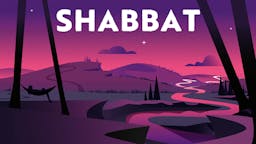
Did God Really Need To Rest? Shabbat's Role In Judaism
Video series • Part 1 of 4 • 8 min
One of the most sacred traditions in Judaism is our weekly celebration of Shabbat, our “day of rest,” when we commemorate that God “rested” after His six days of creation. But wait–why would an omnipotent God need to rest?
Yes, He created the universe – but He’s infinitely powerful! And why would we celebrate Shabbat by emulating the day God rested, not the mind-blowing six days of creation before it? What did God do on His day of rest that was so incredible?
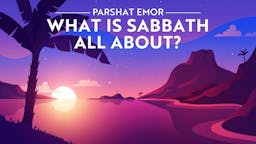
The Importance Of Shabbat In All Jewish Holidays
Video • 9 min
In our Torah reading for holidays, we not only recite the laws of holidays, we include shabbat, and oddest of all, some laws about sacrificing animals. What do all these laws have to do with one another? In this video, Rabbi Fohrman makes a fascinating argument about how Shabbat works and shows that there are shabbatot in different realms.
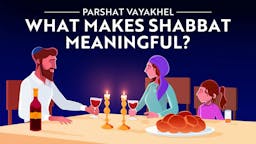
The Meaning And Purpose Of Refraining From Work On Shabbat
Video • 13 min
Let's be honest – what really makes shabbat meaningful? Is it spending time in prayer and meditation, or is it spending time with friends and family, even, often, more so than God?
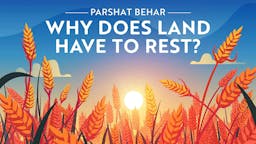
The Spiritual Meaning Of The Sabbath And Jubilee Years
Video • 11 min
We talked last week about seeing shabbat in different worlds. But how do we understand, conceptually, what this means? In this week's video, we look at Pesach, Shmita and Yovel and ask, where do we see Shabbat, and why does it matter?
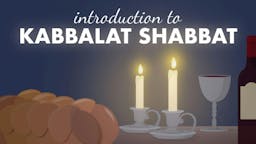
Introduction To Kabbalat Shabbat
Video series • Part 1 of 9 • 54 min
Join Rabbi Fohrman for an in-depth discussion of Kabbalat Shabbat.
What is Aleph Beta?
Aleph Beta is a unique kind of Torah library. Led by our founder, Rabbi David Fohrman, we are dedicated to high-level, textual Torah learning for adults that is intellectually and spiritually sophisticated, that enlivens your Jewish practice and helps you forge a deeper connection to God. Whether you’ve been learning in yeshiva for years or you’re just beginning your Torah journey, you’re sure to find something meaningful and surprising waiting for you here.
Browse our library of over 1,000 beautifully produced animated videos, podcasts, deep dive courses, and printable guides. Topics include the weekly parsha, Jewish holidays & fast days, laws & mitzvot, prayers, relationships, big philosophical ideas and more. Have something to say at the Shabbos table that will amaze your family and guests and bring deep meaning into their lives.

